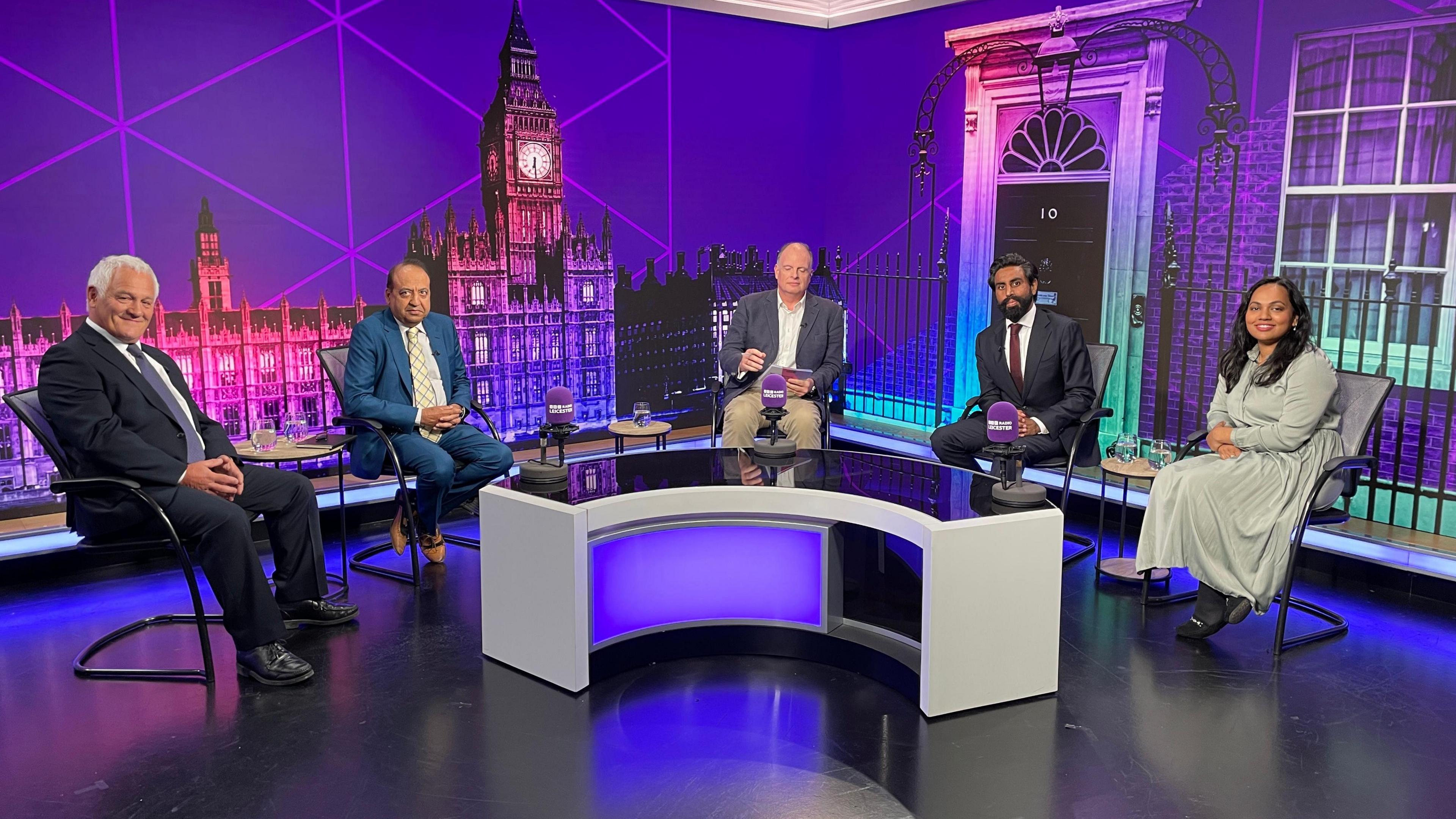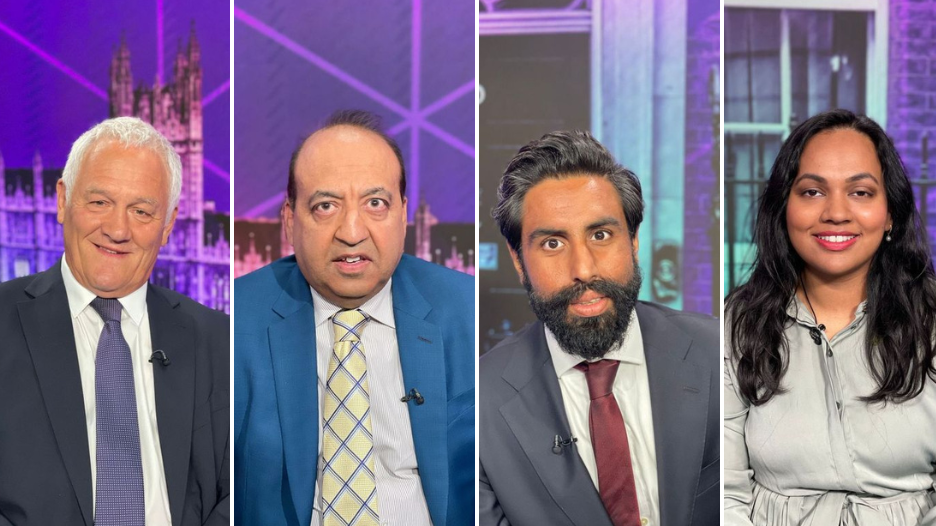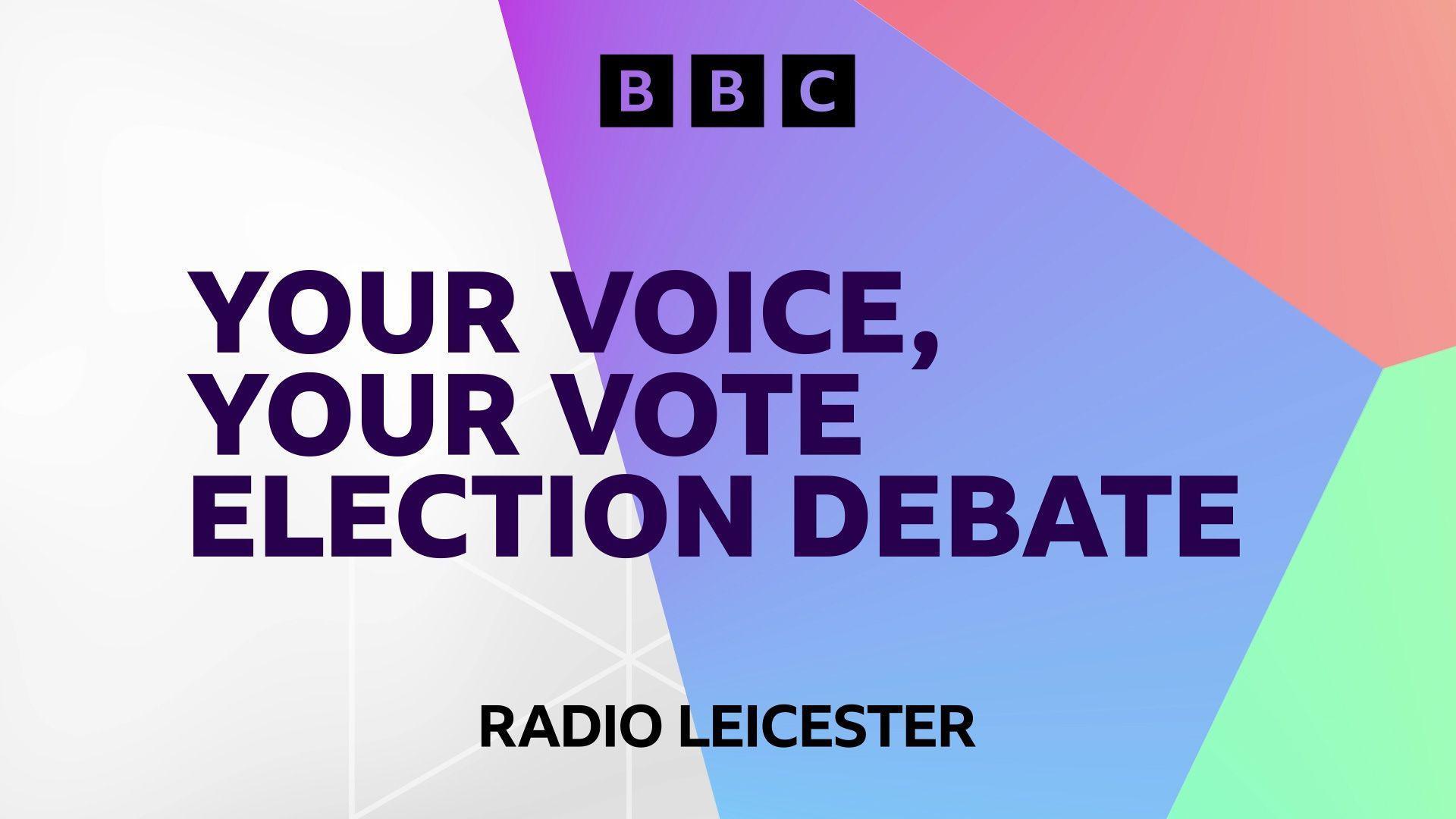What we learned from BBC Leicester's election debate
- Published
General election candidates from across Leicestershire have faced off in a debate hosted by BBC Radio Leicester.
The NHS, the economy, the cost of living and trust in politicians drove the discussion between four candidates hoping to be elected as MPs on Thursday.
The themes that shaped the debate were picked based on messages submitted through the BBC's Your Voice, Your Vote campaign.
But what did we learn from it?
Why an 'empty chair'?
Labour, the Liberal Democrats, Reform UK and the Greens provided candidates for the debate but there was a notable absence.
BBC Leicester invited the Conservatives to attend but they did not provide a representative.
Instead, the party sent a statement.
It said: "In this election, the people of Leicestershire have a choice.
"They can either stick with a plan and return Rishi Sunak to Number 10 continuing to bring down inflation and build a strong economy and deliver a safe and secure future.
"Under Keir Starmer and the Labour party, this is all at risk.
"Labour has no plan for controlling our borders and improving our economy.
"Labour will take us back to square one and cannot be trusted to deliver security in uncertain times."

BBC presenter Ben Jackson (centre) was joined by four Westminster hopefuls ahead of polling day
Jeevun Sandher, who is standing in Loughborough for Labour, said: "The Labour party turned up to this debate as did the other candidates.
"The Conservatives did not show up and that is how much they care about the views and thoughts of those they are apparently seeking to represent.”
What about the NHS?
All the candidates agreed the NHS and the wider care system were under huge pressure.
Sharmen Rahmen, who is standing in Leicester South for the Greens, said her party was the only one being honest about what was required to fix things.
She said the Greens would implement a wealth tax - of 1% on people with assets worth £10m - to fund extra appointments and capacity.
Reform's Andy McWilliam - who is standing in Loughborough - said the NHS was not improving despite the investment in recent years.
Reform, he said, would cut the basic rate of income tax for some NHS staff to encourage them not to leave the service.
Liberal Democrat candidate for Leicester East Zuffar Haq said the city had "lost out again and again" on large amounts of promised NHS funding under both Labour and Tory governments.
He said there needed to be investment in adult social care to prevent bed-blocking in hospitals.
He said Lib Dem tax rises on banks, energy firms and gambling firms would fund £9bn of investment in the care sector.
Mr Sandher said Labour intended to set up a National Care Service to improve standards, pay and staff retention in the care sector.
He said a Labour government would "rebuild and reform" the NHS but admitted it would take time.

Andy McWilliam, Zuffar Haq, Jeevun Sandher and Sharmen Rahmen were all quizzed on why voters should trust them
Voters told BBC Leicester they were concerned about Leicestershire's struggling HIgh Streets.
The Reform and Lib Dem candidates agreed cutting business rates would give much-needed relief to hard-pressed retailers.
Mr Haq said: "We’d scrap business rates. That’s one of the first things we’d do. "Business are struggling to pay their rents and energy costs and the increase in the minimum wage.”
Mr McWilliam said Reform would bring in a 4% tax on online retail deliveries to replace business rates income for councils.
Ms Rahman said the Greens would improve public transport to to support town and city centres by making it easier for people to get to them.
Empty shop units could be filled by encouraging community groups to take them up and make High Streets mor vibrant, Ms Sandher added.
Feeling the pinch
The cost of living loomed large in the discussion.
Mr McWilliam said Reform would invest £1bn in the country's farming industry to try to drive down the price of food and "get rid of re-wilding schemes" to supply agricultural land.
He said there was a "population crisis" rather than a housing crisis and a net zero immigration policy would be needed.
Reform, he said, would cut "green subsidies" ro reduce taxes.
Mrs Rahman said said she was shocked by some of the rhetoric during the campaign which was "scapegoating" minorities.
She said the Greens would help with the cost of living by increasing the minimum wage to £15 and implementing rent controls.
Mr Sandher said 14 years of Conservative government had made everyone poorer and said Labour would invest in green energy schemes that would reduce domestic bills.
Mr Haq also said the Lib Dems would cut bills by investing in green schemes such as funding household insulation.
A question of trust
Each candidate was asked why any voter should trust them to deliver on their promises.
Mr Haq said he was an experienced health campaigner and had a track record of "doing things" in Leicester, including campaigning for a multi-storey car park at the Leicester Royal Infirmary.
Mrs Rahman said she understood why many voters had lost faith in politicians and their promises, describing Labour leader Sir Keir Starmer as "Mr U-turn".
Mr Sandher said Labour's election promises were "ambitious but limited".
“We are not saying yes to everything," he said.
"We aren’t throwing billions of pounds around like the Conservatives and we aren’t announcing a new policy everyday like the Conservatives."
Mr McWilliam said Reform offered a "fresh flavour" to tackling the problems facing the country.

Poll tracker: How do the parties compare?
Voting: Who can I vote for in the general election?
General election 2024: All BBC stories and analysis
Your Voice, Your Vote: Tell us the issues that matter to you
Follow BBC Leicester on Facebook, external, on X, external, or on Instagram, external. Send your story ideas to eastmidsnews@bbc.co.uk, external or via WhatsApp, external on 0808 100 2210.